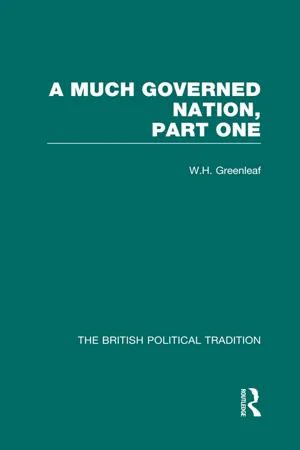Economics
Public Ownership
Public ownership refers to the state or government's ownership and control of resources, industries, or services. This can include public utilities, transportation systems, and natural resources. The primary goal of public ownership is to ensure that essential services are provided to the public and to prevent exploitation by private entities.
Written by Perlego with AI-assistance
Related key terms
1 of 5
9 Key excerpts on "Public Ownership"
- Marian Radetzki, Linda Wårell(Authors)
- 2016(Publication Date)
- Cambridge University Press(Publisher)
Rather, it is a situation in which nations with a strong state involvement become increasingly important in global markets. 11 220 Public Ownership of Commodity Production hands as a matter of course. Until that time, therefore, there was hardly any private entrepreneurship to provide a rod of comparison with state-owned enterprises. Second, the subject is limited, by and large, to the mineral and energy industries. Many countries, especially developing ones, have a large proportion of their mineral and energy sector activities operated by state-owned corporations. In agricultural production, in contrast, public enterprises are regularly of minor importance. In both the third world and the rich industrialized countries, the limited government presence as agricultural producer mainly reflects the dominance of small-scale operations which have always remained in the hands of the local private farmer. A World Bank study from the mid-1980s notes that state ownership in agriculture seldom exceeded 5% of the sector’s output, while in mining 75% or more was common (World Bank, 1983). Despite the virtual absence of state-owned production in agriculture, the government has exerted a major influence over the agricultural sector. This has been done in many countries through ownership of agro-based industries such as sugar refining, or by the maintenance of fiscal monopolies for beverages and tobacco. Sometimes, public involvement has taken the form of development of corporations that provide finance and other services to agriculture. In many cases, public marketing boards have held a monopoly as suppliers of agricultural inputs and a monopsony as buyers of agricultural produce. These boards have ensured stable prices to farmers, but often at a level to yield ample profits to the government owner when the goods were sold in international markets (Floyd et al., 1984).- eBook - ePub
- William Robson, William A. Robson(Authors)
- 2022(Publication Date)
- Routledge(Publisher)
A distinction can be drawn between nationalization, which is generally understood to mean the taking over by the State of a complete industry so that it is owned, managed and controlled for the community, and Public Ownership, which signifies the ownership by the community of any property, whether individual or not, whether embracing a whole industry or only part of it. The State may become the owner of industrial, commercial or agricultural property without necessarily exercising detailed control even over an individual firm—much less over a whole industry.’ 4 This can be done by various means, such as taking equity shares in settlement of death duties, using a budget surplus to purchase equity shares, or imposing a capital levy which could be used for the same purpose. 5 He considered an extension of Public Ownership to be a necessary condition for a further advance towards a more equal distribution of wealth; but thought the case for further nationalization on this ground has not been made out. In this Fabian tract Mr Gaitskell severely criticized certain aspects of the nationalized industries: in particular, the desire of some groups of workers to get more for themselves at the expense of the rest of the community; 1 the low standard of staff loyalty or esprit de corps ; the difficulty of attracting men of the highest ability to accept the top posts at salaries which compare unfavourably with those in private industry; and the failure to devolve sufficient discretion to the lower echelons. 2 THE NEW FABIAN ESSAYISTS A year earlier Mr Roy Jenkins, MP, in New Fabian Essays had argued that if the public sector were much larger it could set the standard of remuneration for the managerial class throughout the economy, whereas with a public sector of only twenty per cent its influence is negligible - M. Tatahi(Author)
- 2006(Publication Date)
- Palgrave Macmillan(Publisher)
Ultimately, then, the persons con- trolling government are the effective owners of state-owned enter- prises, while government or some part of it serves as manager. The concept of what comprises Public Ownership is also another ambi- guity as far as the property rights argument is concerned. It is assumed that the public at large owns this kind of property. While it might be clear that what is called publicly owned differs from area to area, only the enterprises which are owned by the central government can be counted as owned by the whole public of a particular country. However, different enterprises owned by local authorities are also assumed to be publicly owned, although any benefits or losses resulting from those enterprises will presumably remain restricted to the public from those areas, not the entire population of the whole country. The ambiguities and inconsistencies are not restricted to those areas only; ‘mixed’ enterprises offer a case in point. Where can they be located in the relation between public and private ownership? Can the degree of 18 Privatisation Performance participation be the main criterion? Is not such a procedure a mechani- cal procedure? Similarities between public and private enterprises cannot be ignored; they exist in many different ways. It has been one of the main arguments in favour of large privately owned corporations that the risk will be diversified among shareholders. In the case of publicly owned compa- nies, if the owner is the public, then the risk will be diversifiable much more so among taxpayers (taken as the shareholders). Hence, why the latter has little incentive to monitor management compared to the for- mer is an open question.- eBook - PDF
Marx and Contemporary Scientific Thought
Symposium on the Role of Karl Marx in the Development of Contemporary Scientific Thought, Paris, 8, 9, 10 May 1968
- International Council for Philosophy and Humanistic Studies, Paris> Symposium on the Role of Karl Marx in the Development of Contemporary Scientific Thought Symposium on the Role of Karl Marx in the Development of Contemporary Scientific Thought <1968(Authors)
- 2022(Publication Date)
- De Gruyter Mouton(Publisher)
A third group of ideologists argue that the property of the capitalist state is indeed public property, and maintain that the future 418 V.A. Vinogradov belongs to the mixed economy in which private and "public" ownership will be closely intertwined. Attemps by bourgeois economists and sociolo- gists to distort the nature of capitalist state ownership and make it pass for Public Ownership are becoming more and more frequent. Their object is to divert working people from the class struggle, to keep them from at- tacking the system of private ownership. In reality capitalist state ownership, whether it comes about through bourgeois nationalization or as a result of setting up state enterprises financed out of state budgets, is not essen- tially different from the more usual forms of capitalist ownership. The only difference between state enterprises and private capitalist ones lies in the fact that the former constitute the joint property of all capitalists. It is true that capitalist ownership evolves, its froms are changing, but this evolutionary process does not prevent it from continuing to be a form of exploitation, and is not remotely connected with a real "transformation" into Public Ownership. There are many such "theories", but they all have the same object: to support and strengthen the positions of capitalism which have been shattered by history and to perpetuate the method of production based on private ownership and exploitation of man by man. The myth about the everlasting existence and stability of private property has long since been discredited. The experience of the Soviet Union and other socialist countries proves it. - eBook - ePub
- W.H Greenleaf(Author)
- 2014(Publication Date)
- Routledge(Publisher)
There were two areas in which Public Ownership seemed significant in this regard. One was the improvement of the infrastructure of communications: road transport, ports and docks, railways, airways, and postal and cognate services. The other concerned the rationalization of basic industries or resources vital to national efficiency: land, electricity, coal, iron and steel, and so forth. The prevention of waste (as through unnecessary duplication of railway lines); achieving uniformity of charges; amalgamation to achieve economies of scale and lower costs; elimination of surplus capacity; the introduction of new technology: these were the sorts of economic gains in view. To some advocates of Public Ownership, control of the commanding heights was, too, a necessary prerequisite to the prevention of instability and the achievement of effective economic policy and national planning with the object, for instance, of securing full employment or controlling capital investment and the distribution of resources: one thinks of (say) Macmillan or Bevan in this connexion. And natural monopolies (where full exploitation seemed to require only one producer) demanded state ownership if the public was not to suffer. Finally what might be termed the social dimension was never far from consideration. The improvement of the status and condition of the worker would (it was assumed) somehow follow in the wake of Public Ownership leading perhaps to industrial democracy: even that, in consequence, strikes and other unrest might be eliminated. Acceptable levels of service, price, and safety would be secured if necessary by subsidy; and, especially, socially necessary (but unprofitable) provision would more easily be made as with the supply of electricity in rural areas or the maintenance of uneconomic railway lines - eBook - PDF
- Sheila B. Kamerman, Alfred J. Kahn, Sheila B. Kamerman, Alfred J. Kahn, Sheila Kamerman, Alfred Kahn(Authors)
- 2014(Publication Date)
- Princeton University Press(Publisher)
Moreover, the performance of some state-owned enterprises— 40 Paul Starr for example, in Malaysia and France—has been excellent, and it is simply not true that as public sectors grow, rates of economic growth fall (Saun- ders, 1986; Kuttner, 1984). To be sure, the record of central government planning is dismal, but that experience cannot simply be extrapolated to all publicly owned organizations, particularly in states with more decen- tralized structures and more autonomous forms of public sector manage- ment. The property rights approach predicts politically imposed inefficiency on the basis of Public Ownership alone, but the empirical variety of public sectors and state-owned enterprises in the world suggests instead that per- formance may be contingent on political culture, the structure of the state, and government policy toward public enterprises. In some countries public management is well-established, highly professional, and presti- gious, whereas in others the political party in power expects to give its own people jobs at every level. The mode of public sector control depends also on the structure of political-administrative relationships. It is a mis- take in this context to view the state as a unitary actor. Public sectors often comprise a vast sprawl of organizations in Public Ownership, many of them, like public universities in the United States, only loosely con- nected to the centers of political decision making. A great array of insti- tutional devices, such as independent governing boards with self-perpet- uating membership and earmarked financing, can serve to insulate public organizations from political intervention. In their legal status, public or- ganizations variously include agencies under direct political authority, in- dependent authorities incorporated under public law, state-owned enter- prises incorporated under private law, and private companies in which the government has some ownership. - Luc Bernier, Massimo Florio, Philippe Bance, Luc Bernier, Massimo Florio, Philippe Bance(Authors)
- 2020(Publication Date)
- Routledge(Publisher)
Similarly, groundbreaking agreements sometimes require states to privatize certain public enterprises. For example, article 9.6.3 of the US – Australia FTA states: “ Where a government has an ownership interest in a supplier of public telecommunications services, it shall notify the other Party and privatize this sup-plier as soon as feasible. ” The British and US experience has been cited to justify this approach: “ The experience of Great Britain and the United States show that government production in manufacturing is not a necessary condition of development ” (Schmitz, 1996). Even though the nationalization of companies prompted by the 2008 crisis may require us to qualify this statement (Macavoy et al., 2012), and while it is true that it is “ often very di ffi cult to assess precisely for each kind of activity the cost and bene fi t of each type of entity ” (Macavoy et al., 2012), it would seem that some states have already chosen to make fi ne distinctions between economic activities (Bance, 2016). While those in competitive fi elds of strategic interest could be protected by public minority shareholding with golden shares, others in non-competitive fi elds should on the contrary be taken over by the public sector as public service obligations. The days when creating SOEs was the prerequisite for a “ national champion ” strategy (Szamosszegi & Kyle, 2011) and the SOE was the “ jack of all trades ” (Rouban, 2005) seem to be over in industrialized countries. No revolution has taken place, however: SOEs still have an important part to play in the development of poor countries due to the lack of 264 Fabien Bottini private initiative. Moreover, ever since the 19th century, the SOE has had to reach “ its goal without compromising the greater good ” (Langrod, 1956). It would therefore seem that, in future, the SOE will be refocused on general interest activities in the large economies.- Marian Radetzki, Linda Wårell(Authors)
- 2020(Publication Date)
- Cambridge University Press(Publisher)
After illumi- nating the disappointments about Public Ownership that emerged widely during the 1980s, the section discusses the subsequent world- wide wave of privatizations in metal minerals, but not so far in oil, as well as recording some revival of resource nationalism prompted by the resource boom of 2004–2014. It ends by addressing state-owned com- panies in China. Control As noted, many of the publicly owned units in the mineral industry were taken over from foreign owners and an important motivation for the state action was that foreign control over these important industries compromised national sovereignty. State ownership, it was felt, would provide the government with a crucial tool for directing national development. This objective was not satisfactorily achieved. At least two problems were involved. Both have to do with the unclear relation- ship between the management and their owners, typical of state enter- prises (Aharoni, 1982). The first problem, involving too much and poorly coordinated owner intervention, tends to make successful control and direction hard to attain (Dobozi, 1987; Wälde, 1984). In many cases, the owners cannot be clearly identified, and they certainly do not speak with one voice. The state commonly exerts its ownership rights through a variety of individuals and institutions. There is bound to be a tendency for the political-owner representatives who happen to have the greatest influ- ence at a particular time to extract short-term economic or political benefit for themselves or their constituency, without considering the longer term, when they will no longer be in charge, or the nationwide implications. The second problem is that the blurred nature of the principal–agent relationship has sometimes allowed state mineral enterprises to grow into powerful political and economic empires, unrestrained by govern- ment control and public accountability.- eBook - PDF
Governance, Management and Development
Making the State Work
- David Hulme, Mark Turner, Willy McCourt(Authors)
- 2015(Publication Date)
- Red Globe Press(Publisher)
But t h e pat h f rom traditional to modern society was strewn with obstacles. The major o b struction was ‘mar k et f ai l ure’ w h ere goo d s an d services are su b ject to inefficient allocation. In such circumstances, g overnment needed 228 G overnance, Mana g ement an d Deve l o p ment t o ste p in to contro l t h e ‘comman d in g h ei gh ts’ o f t h e econom y an d to intervene where market failure was seen to be inhibiting growth and nationa l progress. One o f t h e po l icies f avoure d b y d eve l oping coun-t ry governments was to esta bl is h pu bl ic enterprises or s t a t e-owne d enterprises (SOEs) to fill the gaps that the private sector could not f i ll . T h ese s t a t e-o wne d pro d uction units so ld t h eir outputs an d were t hus directly involved in the market process. Although the organiz-ations assume d various f orms, we can provi d e a c h ec kl ist, a d apte d from Praxy and Sicherl (1981: 214), of their typical features: • owne d b y pu bl ic aut h orities … to t h e extent o f 50 per cent or more; • un d er t h e top manageria l contro l o f t h e owning pu bl ic aut h or -i ties … including the right to appoint top management and to f ormu l ate critica l po l icy d ecisions; • established for the achievement of a defined set of public pur-p oses, w h ic h may b e mu l ti- d imensiona l in c h aracter ; • en g a g ed in activities of a business character ; • involve the basic idea of investment and returns and servic e Public enterprises were first established by the colonial powers to f aci l itate economic d eve l opment. For examp l e, in Nigeria t h e Britis h started to set up marketing boards in 1936 and converted selected government d epartments into pu bl ic enterprises a f ter 1945, suc h as t he Ni g erian Railwa y Cor p oration and the Ni g erian Ports Authorit y (Adamolekum, 1983). When India became independent in 1947, th e country possesse d more pu bl ic enterprises t h an Britain, t h e f or -mer colonial power.
Index pages curate the most relevant extracts from our library of academic textbooks. They’ve been created using an in-house natural language model (NLM), each adding context and meaning to key research topics.








